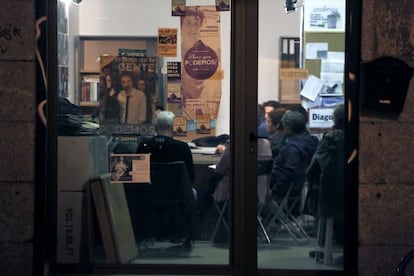The party that came out of nowhere
Spain’s political system is facing a shakeup from Podemos, which was born just a year ago


Less than a year after it was set up, Podemos has managed to become the political party that most Spaniards say they would vote for in a general election, according to two recent opinion polls. So how did this disparate grouping of left-wingers and neighborhood activists manage to seize Spain’s political initiative? In short, says Miguel Urbán, one of the organization’s founder members: people power.
Urbán tells an anecdote that sums up the party’s meteoric rise. “At the movement’s first official meeting, in Zaragoza, a man came up to me and asked if I was from Podemos Zaragoza. I thought, ‘How can I explain to this gentleman that Podemos doesn’t properly exist until we gather 50,000 signatures, present the idea, and then allow people to decide that they want it to exist?’ So I answered, ‘No, I’m from Madrid.’ And the man replied, ‘Delighted to meet you, I’m from Podemos Calatayud’. I didn’t even know we had a Podemos Calatayud.”
In some ways, says Urbán, Podemos is simply putting a name to something that already existed. The initial idea was put forward as a “participative method” at a small theater called the Teatro del Barrio in the working class Lavapiés neighborhood in Madrid in mid-January of this year; it soon generated intense interest via the social networks within groups affiliated to the 15-M movement that had erupted in the spring of 2011 and that rejected what they saw as the responsibility of Spain’s political parties for the economic crisis and their subsequent failing to do anything meaningful about it.
Within a few months it was clear that there was a huge groundswell of support for a new approach to politics that Podemos, which was now led by former university lecturer and regular feature on TV debate shows, Pablo Iglesias. “We have been playing catch-up from the start: first to prepare for the European elections in May, and now for the municipal and regional polls in May of next year, as well, of course, for the general elections [at the end of 2015],” says Urbán.
The Lavapiés neighborhood, with its strong links to the 15-M movement, was the ideal place to start building support
Lavapiés, with its strong links to the 15-M movement, was the ideal place to start building support. “We had hit the glass ceiling, says Miguel Barrionuevo, a 23-year-old sociology student and a member of the neighborhood’s Popular Assembly, which brings its different political groups together. “And rather that just give in, more and more people began to come up with a range of new ideas that filled us with hope and that showed it was possible to come up with a winning project,” he says.
Urbán lives and works in Lavapiés, a stone’s throw from the Teatro del Barrio, where Podemos held its first meetings.
“Podemos was set up in our space because it was born out of different social movements,” says actor Alberto San Juán. He helped set up the Teatro del Barrio as part of a broader initiative that now involves more than 10 other playhouses scattered throughout the narrow, steep streets of this multiracial and highly politicized district, a place where many bars, cafés, shops and social centers host regular meetings and debates organized by a range of tiny leftist fringe groups, many of which now form part of Podemos. “I identify with its roots and hope that it can be a tool by which we can start to govern ourselves,” adds San Juán.
Podemos emerged out of a series of conservations with Pablo more than a year ago”
Urbán has been a political activist since his teens, when he met Iglesias, and was among the first candidates Podemos put forward in the European elections in May, when it won five seats. His experience has seen him play a key role behind the scenes in Podemos.
“Podemos emerged out of a series of conservations with Pablo more than a year ago,” says Urbán, adding: “We started to talk about how the 15-M had opened a window of political opportunity, and that we had to channel people’s anger with politicians and disillusionment with the political process.”
The origins of Podemos also lie in a tiny organization called Izquierda Anticapitalista (Anti-capitalist Left), which has around 600 members nationwide, co-founded a decade ago by Urbán, and which in turn was part of a broader group called Espacio Alternativo (Alternative Space). The rapid growth of Podemos has caused friction within Izquierda Anti-capitalista, many of whose members feel that Podemos doesn’t fully reflect their more radical views. As a result, Urbán now finds himself playing the role of peacekeeper.
Urbán says the name Podemos, which means “We can”, has to be understood in the context of what started out as a movement rather than a party. “Pablo and I were coming back from dinner with some friends and we were talking about the need to put a name to this growing phenomenon, and the idea of ‘we can’ just made sense. Everybody liked it,” he says.
He puts Podemos’ success down to five key factors: The first was to avoid setting up a party and to describe the project as “participative”. Secondly, to send out a positive message that politics was something anybody could be involved in, and that change was possible. Thirdly, “to find somebody with a media presence, which would allow us to appeal to the wider public; “which turned out to be Pablo, who had been presenting an online debate called La Tuerka for the last decade,” says Urbán. And finally, adds Barrionuevo, “to not overly define ourselves, so as to bring together left, right and center to address the real issues that concern people, such as the cuts, corruption, unemployment, housing.”
The formula has proved successful, and will now be put to the test in the municipal and regional elections in May 2015, and then later in the year at the general elections.
Building a plane in flight
The decision-making process in Podemos is carried out through so-called citizens’ assemblies that have their roots in the 15-M movement located in neighborhoods throughout Spain’s towns and cities. They provide a snapshot of how Podemos continues to grow day by day. “We’re building a plane that is already in flight,” says Luis O’Shea, a 60-year-old activist during a meeting in Madrid’s upmarket Salamanca neighborhood attended by around 55 people on November 15.
Each week, hundreds of such meetings are held, sometimes held in bars, others in rented halls, where task groups oversee fundraising, awareness raising and other activities, and are attended by people from a wide range of backgrounds and of all ages prepared to give up their free time, their experience, and in many cases their money at the service of the new party.
“We need to improve our organizational skills, even though this is tedious,” says Geraldo Portela, a 33-year-old who acts as moderator at the organization’s Lavapiés nerve center.
Behind him is a large map of Madrid covered with dozens of drawing pins. “Each one represents a group, but there came a moment when so many were being set up that we simply couldn’t keep up with them; we need to do an update on the new groups, but we just don’t have time,” says Urbán.
Tu suscripción se está usando en otro dispositivo
¿Quieres añadir otro usuario a tu suscripción?
Si continúas leyendo en este dispositivo, no se podrá leer en el otro.
FlechaTu suscripción se está usando en otro dispositivo y solo puedes acceder a EL PAÍS desde un dispositivo a la vez.
Si quieres compartir tu cuenta, cambia tu suscripción a la modalidad Premium, así podrás añadir otro usuario. Cada uno accederá con su propia cuenta de email, lo que os permitirá personalizar vuestra experiencia en EL PAÍS.
En el caso de no saber quién está usando tu cuenta, te recomendamos cambiar tu contraseña aquí.
Si decides continuar compartiendo tu cuenta, este mensaje se mostrará en tu dispositivo y en el de la otra persona que está usando tu cuenta de forma indefinida, afectando a tu experiencia de lectura. Puedes consultar aquí los términos y condiciones de la suscripción digital.








































